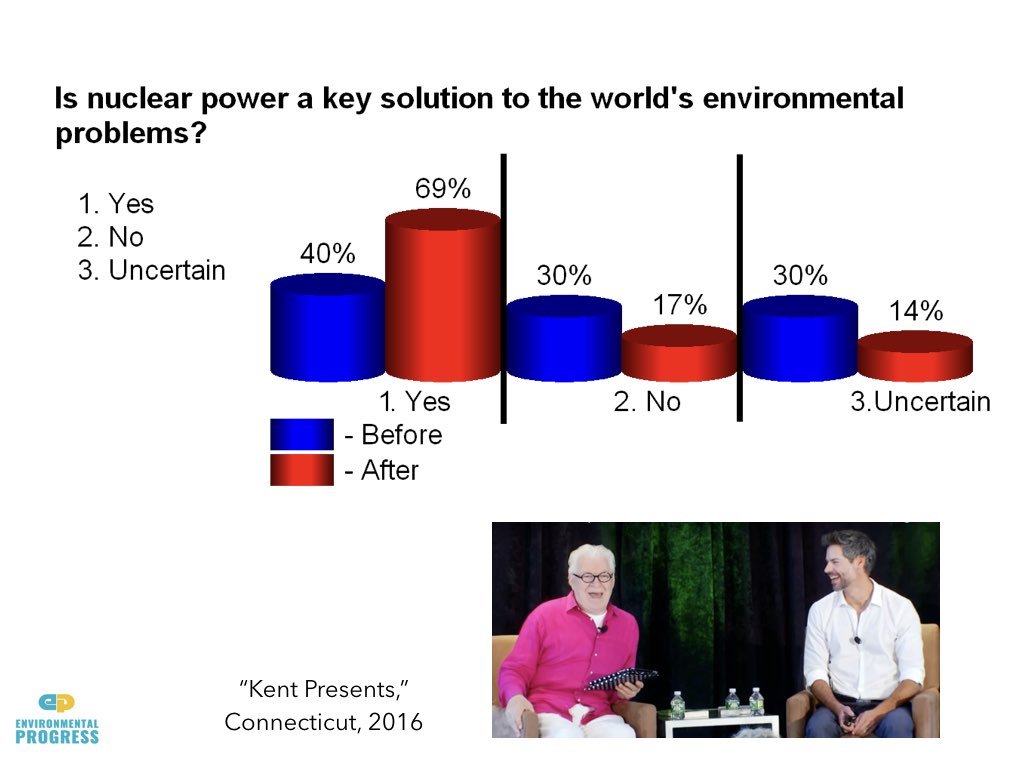Another Pro-Nuclear Victory!! This time in Connecticut, USA! Here's what it means
October 31, 2017
by Michael Shellenberger
In another big victory for pro-nuclear forces, Connecticut Governor Dannel Malloy has signed legislation to prevent that state's sole nuclear plant from closing.
"The importance of this asset," Governor Molloy wrote in his press release announcing he had signed the bill, "to both the state and the region cannot be overstated."
By "this asset" Governor Malloy refers to Millstone Nuclear Power Plant, which provides 96 percent of Connecticut's zero-carbon electricity.
In preventing Millstone from closing prematurely, Governor Malloy has done more to secure his legacy as a champion of climate protection and clean air than anything else he has done since taking office in 2011 — and more than he likely will do before he leaves office.
The victory comes just a week and a half after the pro-nuclear victory over anti-nuclear forces in South Korea, where a citizen jury voted 60 percent to 40 percent to continue that nation's nuclear build-out.
Environmental Progress was intensively involved in advocating to save Millstone, publishing an open letter signed by the world's leading climate scientists and environmentalists — as well as Pulitzer Prize-winner Richard Rhodes and Harvard's Stephen Pinker — and publishing an in-depth analysis of the environmental consequences that would result from its closure.
Then, after legislation to save Millstone nuclear died in the spring, climate scientist and EP Senior Science Advisor James Hansen and I fought to revive the legislation, publishing an oped for the Hartford Courant, the state's largest and most influential newspaper, urging the legislature to revive efforts to save Millstone:
[W]ith the inability of the Connecticut House to pass a bill that would have allowed the state's only nuclear power plant, Millstone, to compete on equal footing with cheap natural gas and heavily subsidized renewables earlier this month, Connecticut is now in danger of losing its largest source of zero-carbon energy.
This is the fourth big victory for Environmental Progress and our pro-nuclear allies saving nuclear plants. Last year we won in New York and Illinois. This year we've won in South Korea and Connecticut.
Would it surprise you to learn that — once again — we vanquished the natural gas industry-funded Sierra Club, which teamed up with Big Oil to fight to replace Millstone with natural gas and a dash of renewables?
Suffice it to say that we atomic humanists were massively outspent by the $100 million/year Sierra Club and its natural gas allies.
The lesson for atomic humanists is clear: advocacy works.
Connecticut shows that it's easy to overthink these things. This is not rocket science. You do the research. You rally the troops. You fight for what's right.
More times than I can remember I've had pro-nuclear friends and acquaintances look at me with sad eyes after I've told them that our ambition is to save nuclear power — everywhere in the world, all at once.
"Yeah, that's going to be hard," they've said. "Really hard," they add, averting their eyes, their voice kind of trailing off, making it clear that what they meant wasn't "really hard" but rather something closer to "impossible."
But it never made sense to me that it would be impossible. Sometimes — I'll admit — it's been very, very hard. Painfully hard, even.
And yet, in an important sense, our job as pro-nuclear advocates is far easier than what our opponents have to do. They have to constantly lie and make things up to hide the shining truth about nuclear. That it's the safest. The cleanest. And that it's the only way to lift everyone in the world out of poverty while saving the natural environment.
All we have to do — as New York, Illinois, South Korea, and now Connecticut prove — is tell the truth.
Last summer, I spoke at a large conference in Kent, Connecticut. They polled the audience before and after I spoke, measuring their support for nuclear.
After my talk, support for nuclear rose almost 30 percentage points, from 40 to 69 percent. What did I say that was so persuasive? Nothing in particular. I just laid out the basic facts of nuclear — just like James Hansen Courage Award winner Bum-Jin Chung did in South Korea.
And the rewards go beyond saving nuclear. One of the great sources of joy for me over the last two years has been working with an incredible group of young staff and research fellows — and brilliant scientists and scholars like Jim Hansen and Dick Rhodes and Steve Pinker.
I know some of them better than others. But I feel I can now call them something more than allies or even atomic humanists. I can now call them friends.



